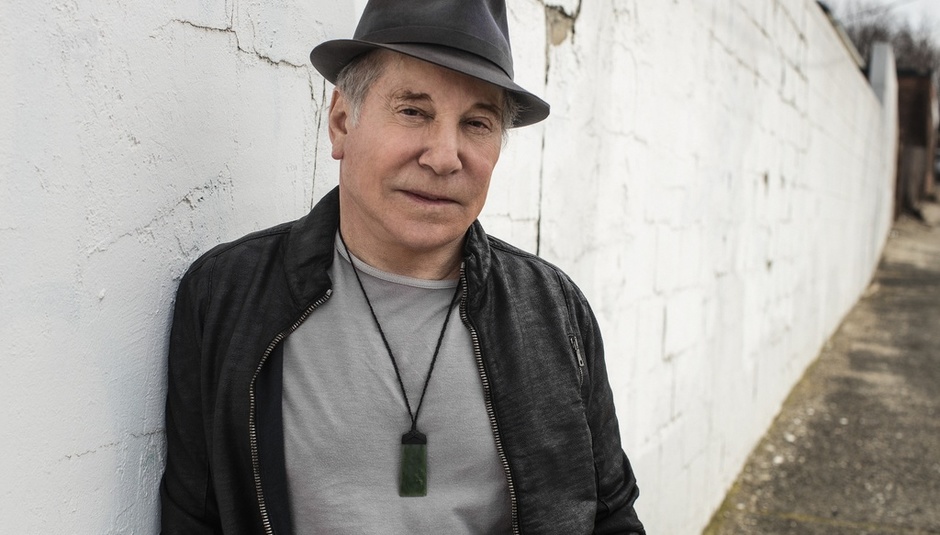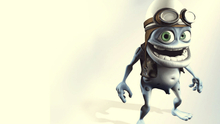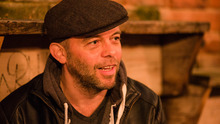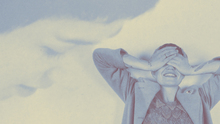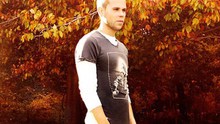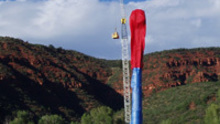In London for an almost literal ‘flying visit’, a two-day press junket to promote the upcoming release of new album Stranger to Stranger (his first since 2011’s So Beautiful or So What), it takes a little while, at first, to synch in to the rhythm of Paul Simon’s speech. Courteous and solicitous in that way that Americans of a certain era frequently appear, our pre-interview preliminaries, once I’ve been ushered into the suite in Claridge’s where Simon is based for the day and introductions are completed (“Jude? Hey Jude?” he asks with a wry grin), consist of the Actual Living Legend guiding me from room to room until we’ve found the best place to sit for my recording set-up and then making sure I’m offered a beverage of my choice, while ordering his own lemon and ginger tea. A brief discussion of the delights of English tea and the perils of caffeine ensues, while all the while my brain is screaming to me, in uncouth txt speak, underneath the surface, something along the lines of “OMFG, ACTUAL Paul Simon, there, in front of you points dies.”
Preliminaries completed, the inner voice’s exclamation marks start to subside slightly as we settle in for the interview proper, Paul answering my questions slowly, in a considered and thoughtful manner, peppered with pauses while he contemplates the best way to express a point, often starting a sentence then back-tracking to revise his words and rearrange them into a better approximation of what he is trying to convey. Every bit the man in his mid-70s he now is, despite the boyish baseball cap and the wrist embellished with beads and bands, he speaks with alternate humour and authority, and almost fierce levels of eye contact.
We start by talking about how his experience of London today compares to the mid-60s era when, famously, he moved over here after the initial failure of first Simon and Garfunkel album Wednesday Morning, 3AM. When I ask if it would still be fair to describe him as an anglophile, he responds with a firm “yes. I lived here a long time ago, but it was such a great time in my life.”
But things must have changed a fair bit since those days, both London itself and, well, his own personal circumstances?
“Well of course. Both. Everything is completely changed. When I was in London in the Sixties I was taking the tube and living in Belsize Park for a while, and in the East End for a while. When I first came I lived in Essex, so it was a completely different world. Travelling around now – I step outside and somebody opens a door to a Mercedes to me, and I step in. So… not the same world.”
Does he miss the earlier free-wheeling days, then? He replies, candidly: “No, not really. You can’t be young when you’re not young, you know? I don’t particularly want to ride the tube and miss the last bus and hitch-hike out in the rain. I’m fine to be spoiled a little bit now.”
Because of course you would be. And the anglophile gene seems to have been passed down to his daughter too, now living and studying here in the UK: “She just loves London and England and travelling. Maybe she got that from me, cos I’m the traveller of the family.”
I’ve had a preview copy of Stranger to Stranger for a couple of weeks leading up to the interview, and I’m really looking forward to Paul talking about it. An album of curious echoes and beats, peopled by mysterious and sometimes disturbing characters, it has a mood and a feel rather unlike anything he’s done before. Turns out Paul, though, wants to know what my views on it are (“I’d actually be very interested to hear what you thought it was about”). Gulp. So I waffle something about how it seems to be more themed around sounds and rhythms than the lyrics and (sigh of relief) he concurs. Was that a deliberate choice?
“Yes, I guess. But not in the sense that I set out and said: Well, the next album that I’m going to do will be about sound and rhythm. But that’s what it became, pretty quickly. Not that I don’t spend a lot of time on the lyrics – I do – but thematically, the music and the sound are more of a unit than the lyrics are.”
A continuation of a process that he started on his previous album, So Beautiful…, he recruited “my old friend and engineer Roy Halee, who did all the Simon and Garfunkel records – in fact, he did the audition tape of Simon and Garfunkel, and did Graceland, and did Rhythm of the Saints, so he’s always been my favourite collaborator”, enticing him out of retirement (“he was bored, he was happy to have a chance to come back”) to work with “bells and overtones to colour sounds, and to create echoes that were different to the echoes that were available through the technology.” With Halee bringing “an analogue sense of how records are made”, along with his other engineer Andy Smith and Paul himself they were able to “translate that analogue aesthetic to the digital world”. As this process went along they focussed on “how a note ends and the next note begins, how textures should change”, making the music feel, he believes, “almost more three dimensional” and also making the lyrics, which he always writes after the music has been laid down, “a little bit more interesting, and – on the tracks that were particularly moving – a little bit more personal as well.”
But when I try to share a little more of my own interpretation, this time of the words, I get gently smacked down. Is there, I ask, a bit of a running theme about mortality in the album?
“I don’t think so, no. I think people look for that as an artist gets older. You think that, well, that’s going to come up. But actually, the only time that it’s there is in the last song – 'The Insomniac’s Lullaby'.”
I had read 'The Werewolf' (one of the album’s standout tracks, I think) as a metaphor for death – not so, then?
“No, 'The Werewolf' is a metaphor for...” he pauses. “I’m trying to find another word for ‘shitstorm’, but there’s a shitstorm, a tsunami coming. You can argue, or keep shopping and do anything you want, but the fact is that we’re in for a very very serious crisis, ecologically. The whole species is at a point where it really must decide whether it’s going to turn this planet into paradise in the next century, or whether things are going to be ruined. And that’s what the werewolf is. ‘The werewolf is coming’, you know?”
As such a master of the album as a format and artefact, having, in my opinion, made one of the all-time best albums in 1986’s Graceland, we move on to talk about how technologies in the last decade or so have affected how people consume music, and how artists themselves can respond to those changes.
“Well, I really like the album form, and I think it’s a natural form, and I don’t think it will disappear. I think there will be a revival of it, because artists like to think in that form. But what iPods and streaming does is it changes sound and attention span and it speeds it up.”
The antidote to that, he believes is for artists making albums to “take that into consideration – and I certainly did with this album. I spent a lot of thought on attention span: how long a song is, at what point do I want to stop saying lyrics and put in a guitar piece for a minute, and just let the brain, you know, absorb the information of the previous songs. “
He also took into account things like song length, varying it on the new album from two minutes ('The Clock') to nearly six ('Proof of Love'). “It’s really impossible to make an assured judgement about people’s attention spans, but I’m thinking about at what point the listener would get bored and the measurement that I have is: when do I get bored. And when I do, I change something – either the subject or the sound, or I stop the song. Because if you don’t stay entertaining, people stop listening, it’s really simple.”
So rather than predicting the death of the album, like many other commentators, he believes that we will see younger artists using it in a different way, taking their sound from “a piece of music that’s purely rhythmic to a neo-classical piece that has no drums at all, or lyrics” for example, with “a new mixture of what we think of as contemporary and pleasing.”
Missing the point a bit, I launch into a convoluted journo-splaining spiel about how this was, surely, what he had long been doing anyway with his music: mixing afrobeat with zydeco, folk with beatpop, jazz with lush orchestral sounds for as long as I can remember listening to him. Once again – and oh-so politely – he puts me right.
“Well, yes I have but… what I’m talking about now is even more than different styles, it’s changes of sound and thinking that keep you alert, keep you involved.
“I don’t need to give you a lot of examples, you know what I mean” he (kindly) adds, “but if your mind is such that you like it when it’s on shuffle and you go from hearing Beyonce to Hank Williams to Django Rheinhardt to some Debussy piece to the Beatles – if you like it when things jump like that, then that way of creating interest will find its way into the album form. Because really when things are on shuffle it’s just like a big album. The individual artist can’t possibly change from one person to another, but they can change enough to keep you interested and entertained. And that’s certainly what I’m trying for with this album.”
In terms of his favourite parts of the new album, Paul wouldn’t really be drawn. “What happens is, once I finish, I really don’t go back and listen to my older albums. By the time I’m finished with it, I’m finished. I know that when I go out to play live I’m going to play Wristband, Werewolf and Stranger to Stranger, but part of the reason I’m doing that is that I can do those songs with an acoustic band.”
Talking of playing live, I wonder if he’ll be coming over to the UK again to do some shows. And it’s good news for fans. “In the autumn. They haven’t announced it yet, but I know that it’s in the works.”
So by now I’m about half-way through my allotted interview time and, as is only polite, I’ve devoted most of it to Stranger to Stranger – the reason he’s speaking to me at all, to be fair. But you just can’t spend any time with someone with such an impressive heritage and history as Paul Simon and just stick to the present day. What I’m really desperate to hear is what has driven him as an artist over all these years and how he now perceives the vast legacy his incredible body of work has left behind. So I start – only slightly less sycophantically than in the preceding sentence– to try and tease out some of this stuff.
I ask him to imagine a Paul Simon who hadn’t become a musician, but he comes back at me with a different interpretation on my question.
“Once I heard the music that I loved I really always was just interested in that. From an early age I was interested in baseball, music and girls, and that’s pretty much the way it’s stayed. Maybe now I’d say also ‘the brain’ – neurology – or a little bit of politics, but essentially not. But the interesting question to me is not what would I have been, but what could I possibly be if I denied my habitual creative impulse towards music.”
He explains that what he is interested to try out, when his next tour ends, is deliberately resisting the musical creative impulse, an impulse that has been with him since he was 13, and decided that he was going to be a songwriter. He wants, for “the next stage of my life” to see “if I could find something else, something that was really as satisfying as music is to me. And I don’t mean like writing a memoir or some, like, adjacent art form, I mean stop, and see: what does your mind think about the universe?”
Fascinating. So he’s never done that before – in other words he’s literally been in a constant state of musical creativity since his teens? “Whenever the impulse for creativity is strong, I channel it towards music. That’s just a habit – or maybe it’s more than a habit: maybe that’s the way it’s supposed to be for my personality. I’m just curious to know if there’s another possibility. But I don’t know the answer.”
But if all that sounds a little like he might be reaching a stage in his life where music is exerting less of a pull, that’s misleading. He admits that he could never imagine travelling, or indeed going anywhere, without a guitar, and feels like, creatively, he’s at the peak of his abilities right now, although he does qualify this. “I don’t feel I’m at the peak of my ability to write hits, I mean, that happened a while ago, when it was just effortless.”
He then goes on to talk about just how effortlessly those hits after hits just spooled out of him over the years.
“I was just writing songs, and a bunch of them turned into hits but, if I wrote 'Fifty Ways To Leave Your Lover' it wasn’t as if I thought: this is going to be a hit. I just wrote the song. I didn’t even think that 'Bridge Over Troubled Water' was a hit.”
Seeing the amazement on my face, he explains: “I thought it was really good, but I didn’t think that it was a hit. I thought 'Cecelia' was a hit, I thought 'Kodachrome' was a hit, but I didn’t think 'Mother and Child Reunion' was going to be a hit, or 'Loves Me Like a Rock', or any number of odd things that I tended to like.”
Rather than chasing record sales, then, what drives him, particularly at this stage in his life (“I’m not thinking about hits, it doesn’t feel like it’s age-appropriate at this point to worry about it, it’s just not what I’m thinking about”) is the process of making music itself, the motivation and its transmission.
“How do you want to make music, why am I making it? What am I really interested in? How do you get there, how do you break it down? What information is hidden that you can sense but you don’t know – what is it that you can barely hear but you know exists, and how do you get there?”
All these are the questions and issues that clearly keep him engaged and passionate, his face animated and his stare intense as he lists them off to me. Once a record is out, however, comes the part with which he is considerably less enamoured.
“Going and convincing people that they should listen to what I’m doing is a lot less interesting.”
This very part of the process we’re engaged in right now then?
“Yeah. You know what it is? You’re talking about yourself all the time, and it’s weird. If we were having a conversation, and I was occupying all the space talking about myself I’d be unbearable. You’d think: my god, why doesn’t this guy ask a question about me?”
Although appealingly self-aware, I do have to stop and think at this point that he’s rather underselling himself. You’re Paul Simon, mate, if I was chatting to you at a party right now I’d still be more than happy for you to be talking about yourself…
But how different is he in everyday life to the public, famous “Paul Simon” most of us have heard of?
“Not too different. I’m probably not as nice, you know. For the most part I’m not going to let my frustrations come out, frustrations that you have in life, but in regular life it does. I try not to. I don’t think there’s that much difference between who you’re talking to now and who you’d be talking to if we met at some social gathering.”
From here the conversation segues into talk of the toxicity of fame (“I think it’s very very dangerous, dangerous for people who are around you too. Fame in general, especially today, when it is much more connected to celebrity than it is to achievement – it’s a dangerous thing”) and, inevitably, since our chat is just the day after his death, the tragic demise of Prince. Paul did know him, but just “a little bit. We met a few times – he was very shy, he was quiet. He basically just loved to play. It was a real shock. I think we met just two or three times, but I thought he was a lovely quiet guy. He really could play. So many big names. In a way it’s somewhat akin to Bowie in that they both had this dramatic, stage, larger-than-life presence.”
Did he know Bowie?
“Barely. People in New York knew that he was sick, but nobody knows anything about Prince because he lived out in Minnesota and he kept to himself.”
Sheesh. My allotted time with the singer has passed by in a flash, and I’m reluctant to end our conversation – engrossing, quite profound in places and at other times almost like chatting to a wise older family friend (to the point where I even occasionally forgot who I was actually talking with) – on such a down note. Instead, I feel compelled to make an awkward, stilted, semi-rehearsed little speech about just how profoundly much his music – from 'Bridge Over Troubled Water' and 'I Am A Rock' comforting me in shit times at Uni to the whole of Graceland (up there in my top albums of all time) and beyond opening my eyes to so much in the way of imagery, rhythm and melody – has meant to me over the years. As if he didn’t know that… I apologise for getting all fangirl on him, and he simply replies “that’s fine Jude”, before heading off for a two-hour lunch break with his daughter, the both of them no doubt enjoying the finer culinary treats that London has to offer these days.
Still crazy after all these years? Not a bit of it. Still lucid, erudite, charming, honest, fiercely intelligent, creative and fascinating? God yes.
Stranger To Stranger is due for release on June 3rd via Virgin EMI.

